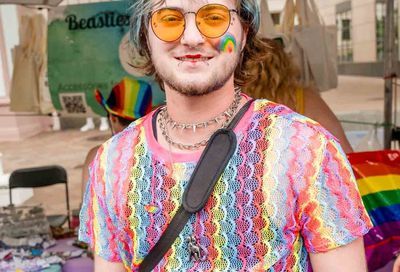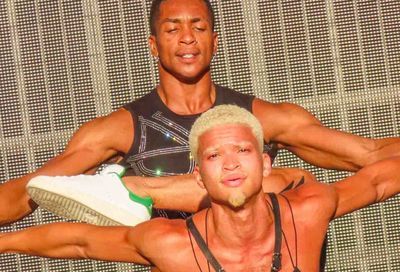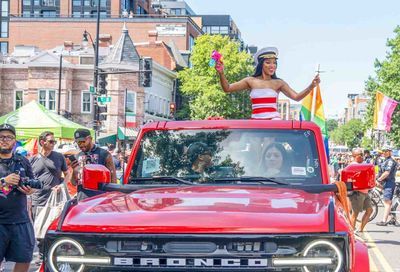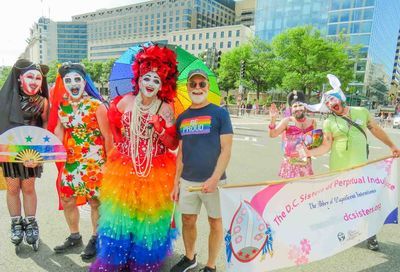Capital Pride’s ‘Totally Radical’ Theme is a Battle Cry for Now
The Capital Pride Alliance is absolutely right to remind us this year of our "Totally Radical" roots, because this is no time to rest.

The word “radical” has an interesting etymology. Its root is essentially that: root.
“The basic sense of the word in all meanings is ‘pertaining or relating to a root or roots,'” advise the fine folks of the Online Etymology Dictionary. Think of radical surgery removing the root cause of an illness. If that surgery is comprehensive, “radical” may seem more akin to its secondary usage. “U.S. youth slang use is from 1983, from 1970s surfer slang meaning ‘at the limits of control.'”
Radical, dude.
Thanks to the Capital Pride Alliance, you should be hearing and seeing the phrase “totally radical” in relatively heavy rotation right now, as it’s the theme of this year’s Capital Pride festivities.
As stated by the CPA, in part, “During the 1980s and 1990s, the LGBTQ+ community, initially referred to as the ‘GLB’ community, realized that the only way to have a meaningful presence in society, a full seat at the table, was to demand and work towards total acceptance of our families and our rights as citizens of the United States.
“The fight for complete and total legal recognition of our partners, the right to serve openly in the armed forces, the right to marry, and the right to honest expression of gender identity all came to a head in the 1990s and set the stage for the changes that happened in the 21st century.
“From pink triangles to Freedom Rings; from KD Lang to RuPaul; from Real World and In the House to Fame and Paris Is Burning; and from Ellen to Will & Grace, we shaped the current LGBTQ+ movement. Our community showed up, spoke up, ACTed UP and created a TOTALLY RADICAL new America.”
Possibly due to my Gen X identity, I think it’s a great theme.
I was living in the lesbian wonderland of Portland, Oregon, when the namesake Ellen came out on Ellen. It was a big deal. I think I still have road-tar remnants on a pair of jeans after “dying in” during some march, laying corpse-like with my peers on the streets of D.C. as we protested for more HIV/AIDS resources.
It was, indeed, a radical time worldwide. South Africa’s racist, anti-democratic Apartheid system of minority rule was crumbling. So, too, was the overreaching Soviet Union, whose republics and satellite states were bolting for the exits and independence. In China, thousands of protesters occupied Tiananmen Square, defying the totalitarian state to plead for democratic reforms, leading the government to declare martial law and kill untold hundreds of them.
The stakes were high, and people died, but we were hopeful we were moving toward a better future. Still, there were a couple of obstacles in the distance that were hard to ignore. One was overpopulation. The other was American demographics.
While a multibillionaire such as Elon Musk may decry population rates, how many more people should this biome support? We should have an easier time managing a population contraction than a population explosion. Fewer people would no doubt be less taxing on the environment. Often, however, you see the arguments against low birth rates morphing into examples of that American-demographics obstacle.
Former GOP Rep. Steve King of Iowa possibly put it the most publicly and honestly with his 2017 tweet, “We can’t restore our civilization with somebody else’s babies.” King said he was referring to culture, not race, even if he got an “Amen!” from the KKK corner.
Regardless, the Anti-Defamation League points to that tweet as evidence of the “Great Replacement Theory” going mainstream. As America’s outright White majority evolves to inhabit a smaller seat at the national table, people do seem to be freaking out. We knew this was coming. I had hoped that Barack Obama’s successful two terms might’ve gotten people to calm down. Instead, we got Donald Trump, the king of White grievance.
Looking at the radical Now, relative to the totally radical Then of the ’80s and ’90s, it’s harder to hold on to hope. The right’s gone rabid.
In the little video Capital Pride made to illustrate the Totally Radical theme, there are snippets of Boy George, RuPaul, Larry Kramer, and many other period personalities, all wrapped up in MTV trappings. I can’t see Kramer without also thinking of Dr. Anthony Fauci.
Back then, the two turned antagonism into collaboration. In fighting HIV/AIDS, they eventually got on more or less the same page. Today, when Fauci should be spending his retirement offering occasional talks and otherwise enjoying a decent measure of respectful reverence, the congressional idiot squad is demanding he sit at a hearing table so that Rep. Marjorie Taylor Greene (R-Ga.) can unload her shit-stinking blather cannon at him at point-blank range.
Looking at the totally radical fights we had at the end of the 20th Century to improve the lives of Gays and Lesbians, we were not paying enough attention to the Trans members of the tribe. But neither were the right-wing nut jobs. The “GLB,” as noted in CPA’s Totally Radical primer, were the targets of politicians trying to rack up culture-war kills. We’re a lot more mainstream now, even if some diehard culture warriors are trying to send us back to the 20th Century.
Most of their cohort, however, decided it would simply be easier to turn their sights on the Transgender/Nonbinary community, with essentially the same playbook. While I first heard the offensive “groomer” accusation in the last century, I’ve heard it used more this century, usually aimed at drag queens.
The Capital Pride Alliance is absolutely right to remind us this year of our Totally Radical roots, because this is no time to rest. Somebody queue up RuPaul, and let’s make 1993’s “Back to My Roots” a Summer 2024 anthem.
Will O’Bryan is a former Metro Weekly managing editor, living in D.C. with his husband. He is online at www.LifeInFlights.com.
Support Metro Weekly’s Journalism
These are challenging times for news organizations. And yet it’s crucial we stay active and provide vital resources and information to both our local readers and the world. So won’t you please take a moment and consider supporting Metro Weekly with a membership? For as little as $5 a month, you can help ensure Metro Weekly magazine and MetroWeekly.com remain free, viable resources as we provide the best, most diverse, culturally-resonant LGBTQ coverage in both the D.C. region and around the world. Memberships come with exclusive perks and discounts, your own personal digital delivery of each week’s magazine (and an archive), access to our Member's Lounge when it launches this fall, and exclusive members-only items like Metro Weekly Membership Mugs and Tote Bags! Check out all our membership levels here and please join us today!






























